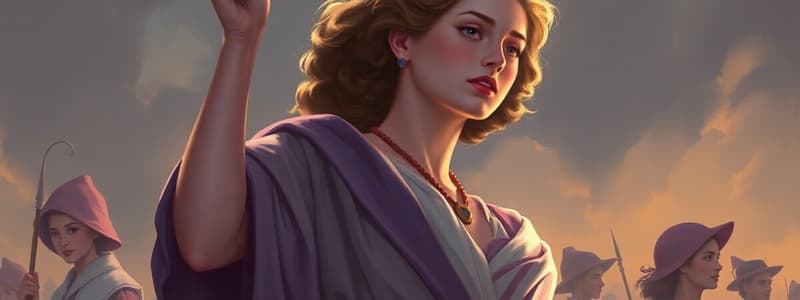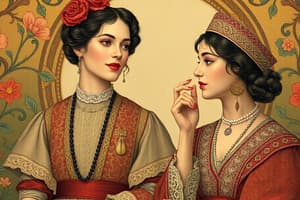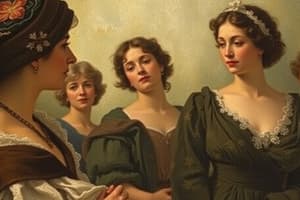Podcast
Questions and Answers
Parker Pillsbury advocated for men to use their existing power within systems to empower women. What was his primary reasoning behind this stance?
Parker Pillsbury advocated for men to use their existing power within systems to empower women. What was his primary reasoning behind this stance?
- He prioritized maintaining the traditional social hierarchy while gradually integrating women into political processes.
- He thought men should dismantle systems of power and control, rather than use them to empower women.
- He saw men's supposed protection of women as a form of oppression, urging them to instead support women's rights. (correct)
- He believed men were inherently better suited to navigate the complexities of politics and should guide women.
What was a significant personal cost Parker Pillsbury endured due to his commitment to the suffrage movement?
What was a significant personal cost Parker Pillsbury endured due to his commitment to the suffrage movement?
- He was imprisoned for his activism but maintained strong family relationships.
- He achieved widespread fame and recognition, leading to numerous opportunities in politics.
- He lost his job, faced financial hardship, suffered health problems, and was often away from his family. (correct)
- He gained significant wealth and social standing but faced criticism from his peers.
What role did Parker Pillsbury play in relation to Susan B. Anthony and Elizabeth Cady Stanton's work?
What role did Parker Pillsbury play in relation to Susan B. Anthony and Elizabeth Cady Stanton's work?
- He publicly debated against them to garner attention for the suffrage cause.
- He co-edited their influential women's rights newspaper, _The Revolution_. (correct)
- He funded their activism but disagreed with their more radical approaches.
- He served as a legal advisor, ensuring their actions were within the bounds of the law.
Based on Pillsbury's quote, "It is mockery to talk of liberty and the pursuit of happiness, until the ballot in the hand of every citizen seals and secures it," what core belief did he hold regarding suffrage?
Based on Pillsbury's quote, "It is mockery to talk of liberty and the pursuit of happiness, until the ballot in the hand of every citizen seals and secures it," what core belief did he hold regarding suffrage?
How does the text characterize individuals involved in the fight for women's rights beyond well-known figures?
How does the text characterize individuals involved in the fight for women's rights beyond well-known figures?
What was the most radical aspect of William Lloyd Garrison's antislavery advocacy, which Abby Kelley Foster adopted?
What was the most radical aspect of William Lloyd Garrison's antislavery advocacy, which Abby Kelley Foster adopted?
How did Abby Kelley Foster finance her education at a Quaker boarding school?
How did Abby Kelley Foster finance her education at a Quaker boarding school?
What does the preacher's exclamation, "This Jezebel is come among us also!" reveal about the perception of Abby Kelley Foster's activism?
What does the preacher's exclamation, "This Jezebel is come among us also!" reveal about the perception of Abby Kelley Foster's activism?
Despite facing opposition, Abby Kelley Foster continued to advocate against slavery. Where did she hold meetings when denied access to traditional venues?
Despite facing opposition, Abby Kelley Foster continued to advocate against slavery. Where did she hold meetings when denied access to traditional venues?
How did Abby Kelley Foster's Quaker upbringing influence her later activism and social views?
How did Abby Kelley Foster's Quaker upbringing influence her later activism and social views?
Matilda Joslyn Gage's upbringing differed from the common societal expectations of children in what key way?
Matilda Joslyn Gage's upbringing differed from the common societal expectations of children in what key way?
How did Matilda Joslyn Gage's early experiences contribute to her later activism?
How did Matilda Joslyn Gage's early experiences contribute to her later activism?
What was unique about Matilda Joslyn Gage's perspective on religion in relation to the women's suffrage movement?
What was unique about Matilda Joslyn Gage's perspective on religion in relation to the women's suffrage movement?
Which of the following best describes the scope of Matilda Joslyn Gage's activism?
Which of the following best describes the scope of Matilda Joslyn Gage's activism?
What can be inferred about the socio-political climate of Matilda Joslyn Gage's time based on the information provided?
What can be inferred about the socio-political climate of Matilda Joslyn Gage's time based on the information provided?
Lucy Burns initiated hunger strikes primarily to achieve which objective within the prison system?
Lucy Burns initiated hunger strikes primarily to achieve which objective within the prison system?
The 'Night of Terror' at Occoquan Workhouse significantly altered public sentiment towards the suffragist movement because it exposed:
The 'Night of Terror' at Occoquan Workhouse significantly altered public sentiment towards the suffragist movement because it exposed:
Lucy Burns and other suffragists burned copies of President Wilson's speeches and an effigy of him primarily to:
Lucy Burns and other suffragists burned copies of President Wilson's speeches and an effigy of him primarily to:
Alice Paul's statement, 'She was a thousand times more valiant than I,' about Lucy Burns suggests that Lucy was perceived as:
Alice Paul's statement, 'She was a thousand times more valiant than I,' about Lucy Burns suggests that Lucy was perceived as:
Lucy Burns' decision to retire from public life after the achievement of suffrage in 1920, despite her pivotal role, indicates:
Lucy Burns' decision to retire from public life after the achievement of suffrage in 1920, despite her pivotal role, indicates:
Flashcards
Who was Matilda Joslyn Gage?
Who was Matilda Joslyn Gage?
Born March 24, 1826, Matilda Joslyn Gage was an advocate for women's rights, abolition, and other reforms.
How was Matilda Joslyn Gage raised?
How was Matilda Joslyn Gage raised?
Matilda's parents raised her to think independently; her father educated her in various subjects, fostering her intellectual curiosity.
What role did the Joslyn house play in the slavery debate?
What role did the Joslyn house play in the slavery debate?
The Joslyn house served as a station on the Underground Railroad, reflecting Matilda's strong abolitionist beliefs.
Who did Matilda Joslyn Gage marry?
Who did Matilda Joslyn Gage marry?
Signup and view all the flashcards
When did Matilda give her first speech?
When did Matilda give her first speech?
Signup and view all the flashcards
Parker Pillsbury
Parker Pillsbury
Signup and view all the flashcards
American Equal Rights Association
American Equal Rights Association
Signup and view all the flashcards
Empowering Women Through Male Action
Empowering Women Through Male Action
Signup and view all the flashcards
Gallantry as Control
Gallantry as Control
Signup and view all the flashcards
The Revolution
The Revolution
Signup and view all the flashcards
Abby Kelley Foster's Lifespan?
Abby Kelley Foster's Lifespan?
Signup and view all the flashcards
Why was Abby Kelley called 'Jezebel'?
Why was Abby Kelley called 'Jezebel'?
Signup and view all the flashcards
Abby Kelley's Family Background?
Abby Kelley's Family Background?
Signup and view all the flashcards
Abby Kelley's Antislavery Stance?
Abby Kelley's Antislavery Stance?
Signup and view all the flashcards
Response to Abby's Activism?
Response to Abby's Activism?
Signup and view all the flashcards
Treatment of Suffragists in Prison
Treatment of Suffragists in Prison
Signup and view all the flashcards
Suffragist Hunger Strikes
Suffragist Hunger Strikes
Signup and view all the flashcards
Suffragist Watchfires
Suffragist Watchfires
Signup and view all the flashcards
The Night of Terror
The Night of Terror
Signup and view all the flashcards
Lucy Burns' Sacrifices
Lucy Burns' Sacrifices
Signup and view all the flashcards
Study Notes
Matilda Joslyn Gage
- Born March 24, 1826 and died March 18, 1898.
- Parents wanted her to think for herself.
- Father was a doctor in Cicero, New York and he taught her Greek, math, and science.
- She helped him dissect small animals to learn about anatomy and systems of the body.
- The Joslyn house was a stop on the Underground Railroad.
- Heard Abby Kelley Foster speak and her abolitionist feelings were fanned into flames.
- She began handing out pamphlets and asking people to sign petitions, she said she thinks she was born with a hatred of oppression.
- At age 18, Matilda married Henry H. Gage, a shopkeeper, and they had 4 children.
- The Gage's home in Fayetteville, New York, became a center for reform activity.
- She championed the rights of African Americans, workers, and women.
- She gave her first speech at a women’s rights convention in Syracuse in 1852, and was only 26 years old at the time.
- She stood on the platform holding her daughter’s hand, she spoke hesitantly at first, but gained confidence as she went along.
- She blamed religion for limiting women’s lives.
- After the Syracuse convention, a newspaper editor was critical of her views.
Studying That Suits You
Use AI to generate personalized quizzes and flashcards to suit your learning preferences.
Description
Parker Pillsbury believed men should leverage their power to empower women. He faced personal costs for suffrage commitment. He assisted Susan B. Anthony and Elizabeth Cady Stanton.




